English Speaking, CSS, Grid and Accessibility at FrontendConf
This year's FrontendConf will feature Leonie Watson , an accessibility evangelist, and Andy Bell , author of the Every Layout e-book, widely known in the global front-end community. The performance of Leonie will be unconventional and technically challenging when the participants' eyesight is not the most important feeling. Andy and Leonie were invited by Pavel Lovtsevich . He organizes conferences in Minsk, invites foreign speakers to his conferences and to us at FrontendConf, oversees reports and all this, not counting the work of the technical director.

On the eve of FrontendConf, we talked with Pavel about his role in the conference program committee, about inviting foreign speakers, accessibility, CSS and Grid Layout, usability of presentations, unobvious trifles, features of the curator, and in the end - why is it important to attend conferences.
- Tell me a few words about yourself, what are you doing?
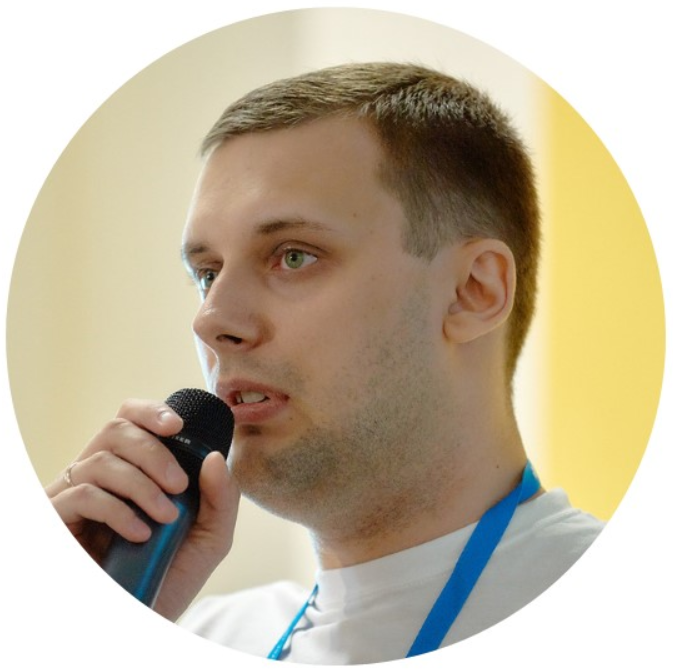 Pavel : I am engaged in front-end and business - I have been working in my company LOVATA for 12 years. Our competencies are in the areas of Product Development Services, e-commerce and MedTech. In the last two areas, we are also developing our own products. I am a technical director at the company: I organize work, implement processes and sometimes write code.
Pavel : I am engaged in front-end and business - I have been working in my company LOVATA for 12 years. Our competencies are in the areas of Product Development Services, e-commerce and MedTech. In the last two areas, we are also developing our own products. I am a technical director at the company: I organize work, implement processes and sometimes write code.
My entry into IT went through HTML layout. I really love this direction of web development, so I was one of the first in the CIS to organize front-end events. The very first is Web Standards Days . Exactly 10 years ago, together with Vadim Makeev, I organized the first WSD in Minsk. This year the fiftieth event will be held, and half of them in Minsk were organized with my direct participation.

Note: Vadim Makeev will speak at FrontendConf 2109. His report is called “ _ ___ ______?” “Despite the provocative and stunning name, we will talk about fonts: system, custom, various others and what changed ten years after the fonts appeared on the Web.
Over the past three years, I have been organizing meetings with the organizing team MinskCSS and MinskJS, as well as a large English-language conference CSS-Minsk-JS . The two-day conference, the theme of the first day of CSS: layout, usability and accessibility. The second day is dedicated to JavaScript with a big focus on programming.
- You organize a lot of conferences, the same CSS-Minsk-JS, but how did you end up in the FrontendConf Program Committee?
Pavel : FrontendConf gives me new acquaintances and communication with a huge number of people from the professional sphere. This broadens my own horizons. Today I do not often write code myself and communicate with participants, speakers, members of the PC allows me to maintain the current level of knowledge.
I make new acquaintances with people from different points of the planet who may be useful. For example, I can invite people to my events. Likewise, from my events I “drag and drop” people to FrontendConf.
I spoke at RIT ++ and participated in its organization, so I met the guys from FrontendConf. I have been in FrontendConf PC for 5 years. Thanks to this, he made many useful contacts in a front-end party in Russia.
The composition of the PC has changed over the past few years, and this is also new acquaintances. Sometimes it happens that you get acquainted with a company representative, with some interesting narrow specialization of development, and after some time you yourself have a need for such expertise and already have an “entrance” to a suitable company. Such a business interest.
- It turns out that not only the conference participants go for networking, but also the PC members?
Pavel : Specifically, in my case this is true. I can give an example. When I spent the first WSD in Minsk 10 years ago, I had the opportunity to meet with the head-end development manager at Headhunter. After some time, the company had a need to attract a partner to solve the problems of its own development department. The head remembered about me and my company, which was the beginning of many years of cooperation between our companies.
Another example. A year and a half ago, I met some speakers at FrontendConf during their preparation for RIT ++. Later he invited two of them to Minsk, and this year, speakers who have already managed to speak with me come to FrontendConf.
- Tell me, what exactly are you doing on the PC?
Pavel : I work a bit with JavaScript, CSS, accessibility and layout, and for the most part - I invite foreign speakers. For three and a half years in a row I have been holding a conference in Minsk, the trick of which is that all the speeches are in English, even for Russian speakers. Therefore, I am in constant contact with English speakers and this simplifies their invitation.
Usually at Russian conferences there are several reports in English. Foreign speakers speak and then get bored. There is no simultaneous translation, and you cannot listen to other reports. We have about half of the program - foreign speakers, so they are not bored. Over the past three years, I have had more than 50 speakers, of which half are foreigners.
At the same time, conversion from invitations to speeches is approximately 25%. When I invited speakers, for 4 years I talked with almost two hundred foreign experts. Now it’s easier for me to invite them to FrontendConf. We are already somehow familiar: we saw each other, called up, wrote off. So I help in inviting English speakers.
- Several speakers from abroad will speak at FrontendConf. It turns out you invited them?
Pavel : Not all, two of them - Andy Bell and Leonie Watson .
- Tell us about them and their reports.
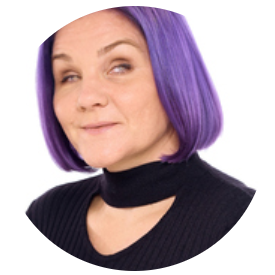 Pavel : Leonie Watson is from England and she is blind. At the same time, she is a developer and acts as an “accessibility advocate”. She is a member of the W3C Advisory Board and co-chair of the W3C Web Applications Working Group. Leonie is extremely interested in developing accessibility ideas. She, like no one else, knows the needs of her audience and people who are faced with physical disabilities.
Pavel : Leonie Watson is from England and she is blind. At the same time, she is a developer and acts as an “accessibility advocate”. She is a member of the W3C Advisory Board and co-chair of the W3C Web Applications Working Group. Leonie is extremely interested in developing accessibility ideas. She, like no one else, knows the needs of her audience and people who are faced with physical disabilities.
Leonie participates in committees that help develop standards to improve accessibility, and talks in reports and articles on their application in project development. She takes part in thematic events, promotes the accessibility of Web-based interfaces and shows by their own example their importance.
Leonie will be performing with the theme “ Web Components and the AOM ”. But this is not an ordinary report, like everything she has. She will stand on stage with her laptop, to which a headset will be connected and a screen reader will be launched. He will help her navigate what is happening on her screen, and viewers will hear through the speakers the sounds in her presentation. This is an interesting technical challenge that I have never encountered before.
- In fact, the participants will feel the same users who need accessibility?
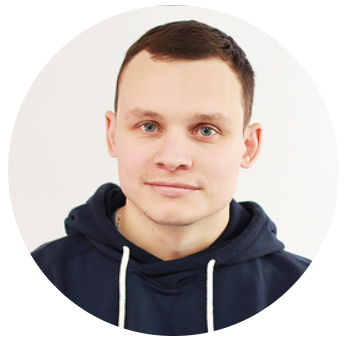 Pavel : Yes, I want to believe that it will work out. Over the past few years, an excellent specialist in this topic has been speaking at FrontendConf - Sergey Krieger . He lives in Germany and comes to deliver excellent reports on accessibility. Sergey, in a clear language and with illustrative examples, talks about accessibility.
Pavel : Yes, I want to believe that it will work out. Over the past few years, an excellent specialist in this topic has been speaking at FrontendConf - Sergey Krieger . He lives in Germany and comes to deliver excellent reports on accessibility. Sergey, in a clear language and with illustrative examples, talks about accessibility.
Note: at FrontendConf in the framework of RIT ++ Sergey made a presentation “Development of accessible interfaces”. Look at his text transcript or video report directly in the article.
I have not met with Leoni before, tried to invite to my events, but it didn’t work out on dates, but I managed to do it on FrontendConf.
- Second speaker Andy Bell. What will he talk about?
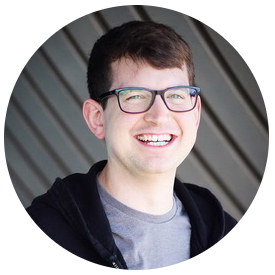 Paul : Andy is also from England. He is an expert in CSS and building design systems that have gained popularity in the past few years. Andy will be coming up with a talk entitled “ Keeping it simple with CSS that scale ” on how to keep CSS code simple when scaling it. It's about writing CSS for large projects.
Paul : Andy is also from England. He is an expert in CSS and building design systems that have gained popularity in the past few years. Andy will be coming up with a talk entitled “ Keeping it simple with CSS that scale ” on how to keep CSS code simple when scaling it. It's about writing CSS for large projects.
CSS is a specific language, but it cannot be said that it is a 100% programming language. He is very simple, declarative, and today he solves his problems well. It’s important to remember that CSS was created 25 years ago to style text, primarily because it still has a specific heritage. This aspect can cause developers on large projects to encounter problems as the CSS codebase grows. Andy Bell will tell you how to cope with these difficulties, live and move forward.
Successfully managed to call him. He is a co-author of the “ Every Layout ” e-book, which is now popular in the front-end community. It is dedicated to creating page layouts. The book was co-written with another one of the most popular frontend specialists - Heydon Pickering . Bringing Andy Bell, which is now in the wake of popularity, is a great opportunity for conference participants to communicate with him personally.
- Question about CSS. Do you think this is a programming language? Alexey Okhrimenko had a report that CSS and HTML together are a programming language, and then there was an ambiguous reaction.
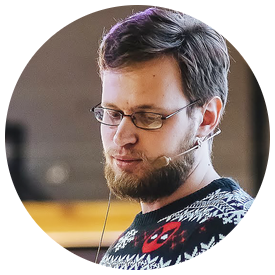 Pavel : I don’t think CSS is a programming language. With a stretch it can be attributed to this category - it is close to this, but so far it remains the language of stylization. This year, Nikita Dubko will speak at FrontendConf with a report on a similar topic in which she will try to prove that CSS is a Turing-complete language .
Pavel : I don’t think CSS is a programming language. With a stretch it can be attributed to this category - it is close to this, but so far it remains the language of stylization. This year, Nikita Dubko will speak at FrontendConf with a report on a similar topic in which she will try to prove that CSS is a Turing-complete language .
CSS is not a typical language. All PLs are similar to each other, and CSS stands apart - it is unique, not like anything. Gradually, he takes over many things and features of real YaP. Perhaps in the future he himself will become a programming language.
Note: Recently, a member of FrontendConf PC Andrey Smirnov interviewed Nikita in an experimental podcast format. They discussed preparation for reports, impostor syndrome, work at Yandex, and Nikita's future report, which Pavel was talking about.
- You invited foreign speakers, but did you help supervise the Russian-speaking speakers?
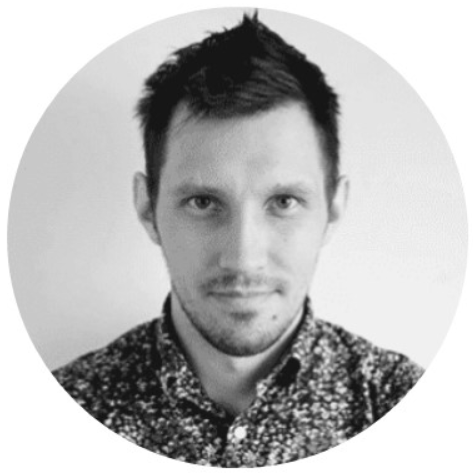 Pavel : Yes, he helped to supervise the report of Sergei Popov , he is also in the PC. He has a report “ display: grid; grid: subgrid »about subgrid.
Pavel : Yes, he helped to supervise the report of Sergei Popov , he is also in the PC. He has a report “ display: grid; grid: subgrid »about subgrid.
CSS was originally created as a text styling language. But over the years of the Web’s development, its role has changed dramatically. Now in the "text styling language" we are fully developing user interfaces.
A few years ago, the CSS Grid Layout module first appeared in the language specification. This is the first specially designed way to place large interface elements on a page. This is a new way to create page layouts. Sergey talked about this at RIT ++ 2017 .
For the speedy appearance of this feature in browsers, a block that describes the operation of subgrid has been removed from the specification. They were moved to the next version. On the threshold of introducing subgrid into popular browsers, Sergey will share their capabilities and applications.
- Sergey Popov and the speaker, and a member of the PC, and you oversee his report. What does it look like from the outside? This is not work with a beginner, everything is different.
Pavel : I'll start from afar. The culture of speaking at conferences in the West is different from ours. One of the features of Western speakers is personal responsibility . Everyone is responsible for his or her reputation. If screwed up - they won’t invite anyone else. They will look at the unsuccessful performance, and no one will want to take risks.
The second feature is the well-developed self-presentation skills that accompany the performance. Speakers know how to submit and sell themselves, keep well on stage. Even the simplest things they will talk interestingly. Perhaps this is due to the education system in Europe and the United States.
I would say that Sergey Popov is close to foreign speakers, despite the Russian mentality. He always has a good performance, presentation and presentation. He keeps well and behaves lively on stage. We can always be sure that his performance will be good.
When a PC member submits an application, he does not vote for himself. He participates in the selection on a common basis with everyone else. Will his report be interesting or not, is discussed along with all other applications.

In the case of Sergey, he always has good reviews, high marks for his speeches. He is a frequent speaker at various events, not only in Russia. Of course, if the PC believes that the topic is interesting, ceteris paribus Sergey's report can be adopted earlier. This is the speaker whom they know and want to see on stage - in this situation it is easier.
- For speakers with little experience, it is probably important to see your report from the side. An experienced Program Committee understands better how to present a report. Is there a need for seasoned speakers to get an analysis of the report from the outside?
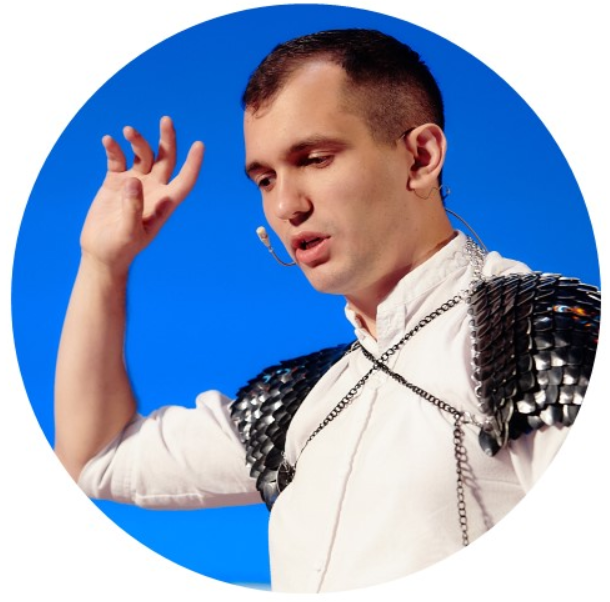 Pavel : Each individual, cannot be said for everyone. For example, there is a famous front-end developer Andrei Sitnik . Last year, I oversaw his report at RIT ++, and we needed a phone call. Before calling, he managed to make a draft version of the report at the meeting, and then at another event. Then he said that he received a feedback: “I have an idea to deploy the report in the other direction, like that. What do you think about the PC, where is it worth moving within the framework of RIT ++? ”
Pavel : Each individual, cannot be said for everyone. For example, there is a famous front-end developer Andrei Sitnik . Last year, I oversaw his report at RIT ++, and we needed a phone call. Before calling, he managed to make a draft version of the report at the meeting, and then at another event. Then he said that he received a feedback: “I have an idea to deploy the report in the other direction, like that. What do you think about the PC, where is it worth moving within the framework of RIT ++? ”
Andrey is a very famous speaker, the author of tools that are used by many front-end developers in the world every day. From the outside it seems that he is self-sufficient and does not need a different opinion. But at the same time, he is an open person, does not suffer from star disease, and is always open to dialogue.
- How did you help with the reports, what work did you do?
Pavel : Usually, when I work with speakers, I always look at the presentation. Sometimes even experienced speakers make mistakes.
For example, slides without numbers are common. I always recommend numbering slides. During the lecture, the audience has questions and students write down the number of the slide on which questions arose. When the Q&A session begins, the numbers save time: “My question is about slide 52.” If there are no numbers on the slides, then you have to look for them, scroll through the presentation.
When there are numbers, the session is more effective, more people will be able to ask a question and get answers to it.
Another common mistake is placing the slide number at the bottom of the presentation . Most of the events take place in the halls with flat floors, this is not an amphitheater. Accordingly, the further a person sits, the more goals he has in front, the higher the probability that the lower part of the presentation is not visible.
These are tricks that even experienced speakers forget about. I help to watch the slides, I give this kind of advice and recommendations on the usability of the slides, their perception.
Sometimes I give recommendations for design, when the speaker may go beyond the rules of the event. Usually this framework refers to the fact that the speaker should not offend anyone. The presentation is inspected for “Code of Conduct” to assist the presenter. We do not expect that someone will do something intentionally, but it happens by chance, so we help not to make a mistake.
PC helps with runs . Often, the speaker does not have a suitable audience for rehearsals. At work, he is shy, it makes no sense to talk at home, because they do not understand and can not give feedback. Therefore, we are happy to help speakers by simply listening to them and providing this feedback. One or two iterations of runs and you can hone speed, expressions, answers to questions.
- Runs full-time or can be phoned?
Pavel : Yes, of course they can. I am in Minsk, Popov in St. Petersburg, and Zakharov in Moscow. Even if the entire PC was in one city, then the speakers in other cities or even countries. It is impossible to meet everyone to drive away the report.
We have full-time runs the day before the conference. When a site is being prepared, a stage, equipment is being assembled, then on this day you can come up and send out a report. The PC has a watch there, scheduled duty. Anyone can sign up, come up at a certain time and tell a report in an audience in which, according to the plan of the conference, he will speak. This helps relieve stress, get used to the place. Everything will be familiar, it will be easier during the present performance, and an extra run will never hurt.
- Will you be present at the reports of your wards? In general, do you go to the reports of those whom you oversee?
Pavel : Not always. I can’t say that there is such a rule. For example, Sergey is such an experienced speaker that there is no need to go to his speech to support him. But I looked at The State of CSS with pleasure. He constantly said hello to the front row :). Well, he doesn’t need it, my presence is just a desire to watch a great performance.
But, in other cases, I may be present at the beginning and at the end of the performance. In the beginning - to cheer, in the end - to help with answers to questions, if necessary. Here I am motivated by a desire to provide support.
At the last RIT ++, I also oversaw Sergey Krieger. I listened to him three times before the performance. This is a super-experienced speaker and there was no need to listen to the report for the fourth time already at the speech itself. I know that everything will go well. He did a great job without me, I’m absolutely not needed here. Therefore, I simply went to another report to find out something new.
Pavel : It’s worth going to conferences and meetings for the same reasons that were discussed at the beginning - networking . Not only the participants come for him, but also the members of the PC.
Even if it is possible to see the reports in the recording, this is a one-way communication. I heard, I can understand, but there is no way to clarify. It will not be possible to approach the speaker and ask narrow questions on the subject, ask to parse your problem.

Watching the video after the conference will not give all the possibilities of personal presence at the event. At the conference there is “access to the body” of the speaker - this is very valuable.
The rest is networking - meeting with colleagues in the industry, company representatives. No one ever knows where he will work, which team he will get in 5 years.
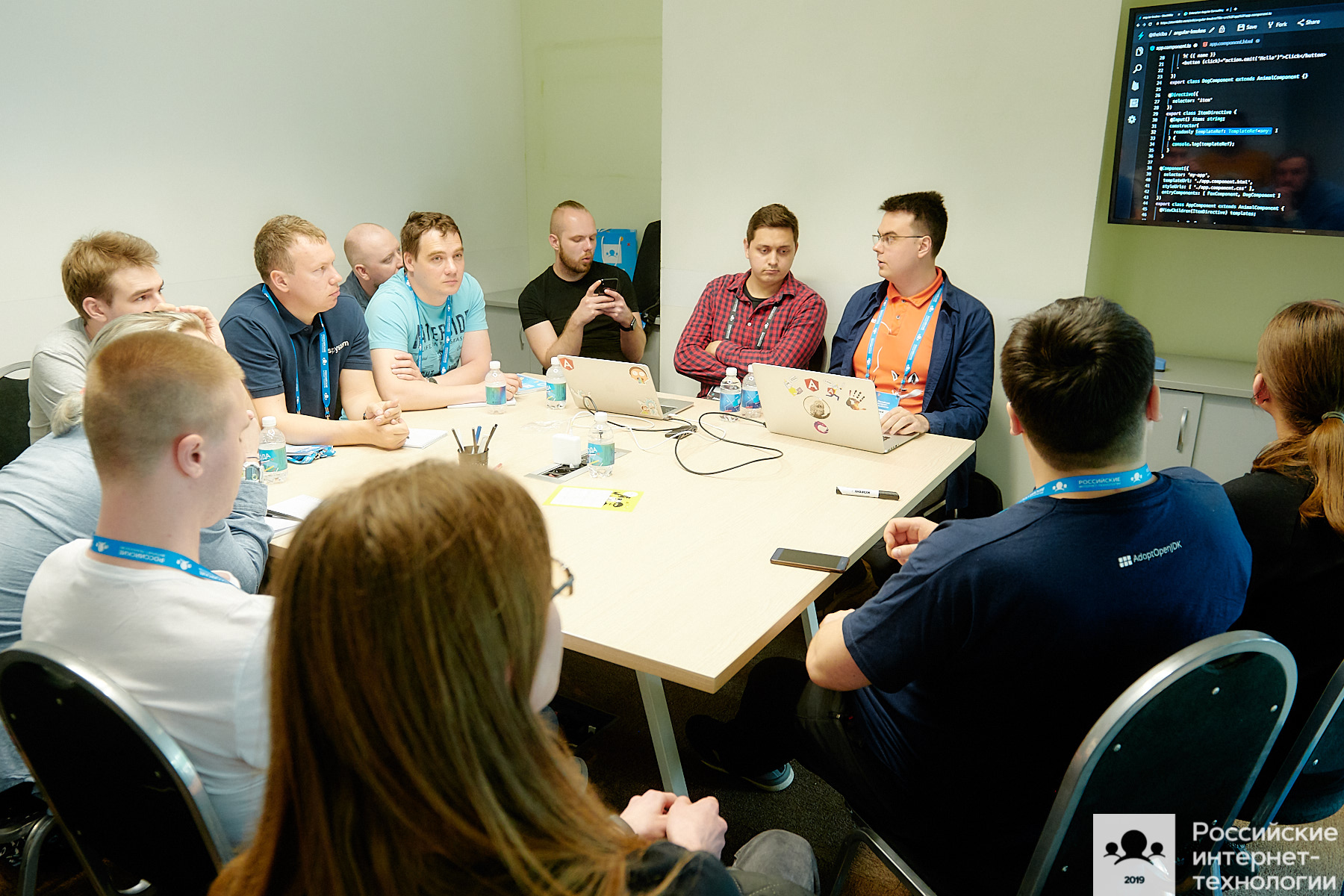
Everyone should have some reasonable degree of personal interest in making dating at such events. Tracks can cross, which can help in a career. Presentations are very important, but networking is just as important.

On the eve of FrontendConf, we talked with Pavel about his role in the conference program committee, about inviting foreign speakers, accessibility, CSS and Grid Layout, usability of presentations, unobvious trifles, features of the curator, and in the end - why is it important to attend conferences.
- Tell me a few words about yourself, what are you doing?
 Pavel : I am engaged in front-end and business - I have been working in my company LOVATA for 12 years. Our competencies are in the areas of Product Development Services, e-commerce and MedTech. In the last two areas, we are also developing our own products. I am a technical director at the company: I organize work, implement processes and sometimes write code.
Pavel : I am engaged in front-end and business - I have been working in my company LOVATA for 12 years. Our competencies are in the areas of Product Development Services, e-commerce and MedTech. In the last two areas, we are also developing our own products. I am a technical director at the company: I organize work, implement processes and sometimes write code.
My entry into IT went through HTML layout. I really love this direction of web development, so I was one of the first in the CIS to organize front-end events. The very first is Web Standards Days . Exactly 10 years ago, together with Vadim Makeev, I organized the first WSD in Minsk. This year the fiftieth event will be held, and half of them in Minsk were organized with my direct participation.

Note: Vadim Makeev will speak at FrontendConf 2109. His report is called “ _ ___ ______?” “Despite the provocative and stunning name, we will talk about fonts: system, custom, various others and what changed ten years after the fonts appeared on the Web.
Over the past three years, I have been organizing meetings with the organizing team MinskCSS and MinskJS, as well as a large English-language conference CSS-Minsk-JS . The two-day conference, the theme of the first day of CSS: layout, usability and accessibility. The second day is dedicated to JavaScript with a big focus on programming.
Participation in PC is a big networking
- You organize a lot of conferences, the same CSS-Minsk-JS, but how did you end up in the FrontendConf Program Committee?
Pavel : FrontendConf gives me new acquaintances and communication with a huge number of people from the professional sphere. This broadens my own horizons. Today I do not often write code myself and communicate with participants, speakers, members of the PC allows me to maintain the current level of knowledge.
I make new acquaintances with people from different points of the planet who may be useful. For example, I can invite people to my events. Likewise, from my events I “drag and drop” people to FrontendConf.
I spoke at RIT ++ and participated in its organization, so I met the guys from FrontendConf. I have been in FrontendConf PC for 5 years. Thanks to this, he made many useful contacts in a front-end party in Russia.
Participation in the program committee is a big networking.
The composition of the PC has changed over the past few years, and this is also new acquaintances. Sometimes it happens that you get acquainted with a company representative, with some interesting narrow specialization of development, and after some time you yourself have a need for such expertise and already have an “entrance” to a suitable company. Such a business interest.
- It turns out that not only the conference participants go for networking, but also the PC members?
Pavel : Specifically, in my case this is true. I can give an example. When I spent the first WSD in Minsk 10 years ago, I had the opportunity to meet with the head-end development manager at Headhunter. After some time, the company had a need to attract a partner to solve the problems of its own development department. The head remembered about me and my company, which was the beginning of many years of cooperation between our companies.
Another example. A year and a half ago, I met some speakers at FrontendConf during their preparation for RIT ++. Later he invited two of them to Minsk, and this year, speakers who have already managed to speak with me come to FrontendConf.
Networking is an endless expansion of the circle of friends. You never know who and how will be useful to you and to whom you yourself can be useful.
- Tell me, what exactly are you doing on the PC?
Pavel : I work a bit with JavaScript, CSS, accessibility and layout, and for the most part - I invite foreign speakers. For three and a half years in a row I have been holding a conference in Minsk, the trick of which is that all the speeches are in English, even for Russian speakers. Therefore, I am in constant contact with English speakers and this simplifies their invitation.
Usually at Russian conferences there are several reports in English. Foreign speakers speak and then get bored. There is no simultaneous translation, and you cannot listen to other reports. We have about half of the program - foreign speakers, so they are not bored. Over the past three years, I have had more than 50 speakers, of which half are foreigners.
At the same time, conversion from invitations to speeches is approximately 25%. When I invited speakers, for 4 years I talked with almost two hundred foreign experts. Now it’s easier for me to invite them to FrontendConf. We are already somehow familiar: we saw each other, called up, wrote off. So I help in inviting English speakers.
About foreign speakers
- Several speakers from abroad will speak at FrontendConf. It turns out you invited them?
Pavel : Not all, two of them - Andy Bell and Leonie Watson .
- Tell us about them and their reports.
 Pavel : Leonie Watson is from England and she is blind. At the same time, she is a developer and acts as an “accessibility advocate”. She is a member of the W3C Advisory Board and co-chair of the W3C Web Applications Working Group. Leonie is extremely interested in developing accessibility ideas. She, like no one else, knows the needs of her audience and people who are faced with physical disabilities.
Pavel : Leonie Watson is from England and she is blind. At the same time, she is a developer and acts as an “accessibility advocate”. She is a member of the W3C Advisory Board and co-chair of the W3C Web Applications Working Group. Leonie is extremely interested in developing accessibility ideas. She, like no one else, knows the needs of her audience and people who are faced with physical disabilities.
Leonie participates in committees that help develop standards to improve accessibility, and talks in reports and articles on their application in project development. She takes part in thematic events, promotes the accessibility of Web-based interfaces and shows by their own example their importance.
Leonie will be performing with the theme “ Web Components and the AOM ”. But this is not an ordinary report, like everything she has. She will stand on stage with her laptop, to which a headset will be connected and a screen reader will be launched. He will help her navigate what is happening on her screen, and viewers will hear through the speakers the sounds in her presentation. This is an interesting technical challenge that I have never encountered before.
- In fact, the participants will feel the same users who need accessibility?
 Pavel : Yes, I want to believe that it will work out. Over the past few years, an excellent specialist in this topic has been speaking at FrontendConf - Sergey Krieger . He lives in Germany and comes to deliver excellent reports on accessibility. Sergey, in a clear language and with illustrative examples, talks about accessibility.
Pavel : Yes, I want to believe that it will work out. Over the past few years, an excellent specialist in this topic has been speaking at FrontendConf - Sergey Krieger . He lives in Germany and comes to deliver excellent reports on accessibility. Sergey, in a clear language and with illustrative examples, talks about accessibility.
Note: at FrontendConf in the framework of RIT ++ Sergey made a presentation “Development of accessible interfaces”. Look at his text transcript or video report directly in the article.
To take over the experience of using accessibility tools from a person who is personally interested in promoting relevant standards, because she has no alternative, is unusual and interesting.
I have not met with Leoni before, tried to invite to my events, but it didn’t work out on dates, but I managed to do it on FrontendConf.
- Second speaker Andy Bell. What will he talk about?
 Paul : Andy is also from England. He is an expert in CSS and building design systems that have gained popularity in the past few years. Andy will be coming up with a talk entitled “ Keeping it simple with CSS that scale ” on how to keep CSS code simple when scaling it. It's about writing CSS for large projects.
Paul : Andy is also from England. He is an expert in CSS and building design systems that have gained popularity in the past few years. Andy will be coming up with a talk entitled “ Keeping it simple with CSS that scale ” on how to keep CSS code simple when scaling it. It's about writing CSS for large projects.
CSS is a specific language, but it cannot be said that it is a 100% programming language. He is very simple, declarative, and today he solves his problems well. It’s important to remember that CSS was created 25 years ago to style text, primarily because it still has a specific heritage. This aspect can cause developers on large projects to encounter problems as the CSS codebase grows. Andy Bell will tell you how to cope with these difficulties, live and move forward.
Successfully managed to call him. He is a co-author of the “ Every Layout ” e-book, which is now popular in the front-end community. It is dedicated to creating page layouts. The book was co-written with another one of the most popular frontend specialists - Heydon Pickering . Bringing Andy Bell, which is now in the wake of popularity, is a great opportunity for conference participants to communicate with him personally.
- Question about CSS. Do you think this is a programming language? Alexey Okhrimenko had a report that CSS and HTML together are a programming language, and then there was an ambiguous reaction.
 Pavel : I don’t think CSS is a programming language. With a stretch it can be attributed to this category - it is close to this, but so far it remains the language of stylization. This year, Nikita Dubko will speak at FrontendConf with a report on a similar topic in which she will try to prove that CSS is a Turing-complete language .
Pavel : I don’t think CSS is a programming language. With a stretch it can be attributed to this category - it is close to this, but so far it remains the language of stylization. This year, Nikita Dubko will speak at FrontendConf with a report on a similar topic in which she will try to prove that CSS is a Turing-complete language .
CSS is not a typical language. All PLs are similar to each other, and CSS stands apart - it is unique, not like anything. Gradually, he takes over many things and features of real YaP. Perhaps in the future he himself will become a programming language.
Note: Recently, a member of FrontendConf PC Andrey Smirnov interviewed Nikita in an experimental podcast format. They discussed preparation for reports, impostor syndrome, work at Yandex, and Nikita's future report, which Pavel was talking about.
Features of the curator
- You invited foreign speakers, but did you help supervise the Russian-speaking speakers?
 Pavel : Yes, he helped to supervise the report of Sergei Popov , he is also in the PC. He has a report “ display: grid; grid: subgrid »about subgrid.
Pavel : Yes, he helped to supervise the report of Sergei Popov , he is also in the PC. He has a report “ display: grid; grid: subgrid »about subgrid.
CSS was originally created as a text styling language. But over the years of the Web’s development, its role has changed dramatically. Now in the "text styling language" we are fully developing user interfaces.
A few years ago, the CSS Grid Layout module first appeared in the language specification. This is the first specially designed way to place large interface elements on a page. This is a new way to create page layouts. Sergey talked about this at RIT ++ 2017 .
For the speedy appearance of this feature in browsers, a block that describes the operation of subgrid has been removed from the specification. They were moved to the next version. On the threshold of introducing subgrid into popular browsers, Sergey will share their capabilities and applications.
- Sergey Popov and the speaker, and a member of the PC, and you oversee his report. What does it look like from the outside? This is not work with a beginner, everything is different.
Pavel : I'll start from afar. The culture of speaking at conferences in the West is different from ours. One of the features of Western speakers is personal responsibility . Everyone is responsible for his or her reputation. If screwed up - they won’t invite anyone else. They will look at the unsuccessful performance, and no one will want to take risks.
The second feature is the well-developed self-presentation skills that accompany the performance. Speakers know how to submit and sell themselves, keep well on stage. Even the simplest things they will talk interestingly. Perhaps this is due to the education system in Europe and the United States.
I would say that Sergey Popov is close to foreign speakers, despite the Russian mentality. He always has a good performance, presentation and presentation. He keeps well and behaves lively on stage. We can always be sure that his performance will be good.
When a PC member submits an application, he does not vote for himself. He participates in the selection on a common basis with everyone else. Will his report be interesting or not, is discussed along with all other applications.

In the case of Sergey, he always has good reviews, high marks for his speeches. He is a frequent speaker at various events, not only in Russia. Of course, if the PC believes that the topic is interesting, ceteris paribus Sergey's report can be adopted earlier. This is the speaker whom they know and want to see on stage - in this situation it is easier.
- For speakers with little experience, it is probably important to see your report from the side. An experienced Program Committee understands better how to present a report. Is there a need for seasoned speakers to get an analysis of the report from the outside?
 Pavel : Each individual, cannot be said for everyone. For example, there is a famous front-end developer Andrei Sitnik . Last year, I oversaw his report at RIT ++, and we needed a phone call. Before calling, he managed to make a draft version of the report at the meeting, and then at another event. Then he said that he received a feedback: “I have an idea to deploy the report in the other direction, like that. What do you think about the PC, where is it worth moving within the framework of RIT ++? ”
Pavel : Each individual, cannot be said for everyone. For example, there is a famous front-end developer Andrei Sitnik . Last year, I oversaw his report at RIT ++, and we needed a phone call. Before calling, he managed to make a draft version of the report at the meeting, and then at another event. Then he said that he received a feedback: “I have an idea to deploy the report in the other direction, like that. What do you think about the PC, where is it worth moving within the framework of RIT ++? ”
Andrey is a very famous speaker, the author of tools that are used by many front-end developers in the world every day. From the outside it seems that he is self-sufficient and does not need a different opinion. But at the same time, he is an open person, does not suffer from star disease, and is always open to dialogue.
- How did you help with the reports, what work did you do?
Pavel : Usually, when I work with speakers, I always look at the presentation. Sometimes even experienced speakers make mistakes.
For example, slides without numbers are common. I always recommend numbering slides. During the lecture, the audience has questions and students write down the number of the slide on which questions arose. When the Q&A session begins, the numbers save time: “My question is about slide 52.” If there are no numbers on the slides, then you have to look for them, scroll through the presentation.
The numbers on the slides save time and allow you to use it more efficiently.
When there are numbers, the session is more effective, more people will be able to ask a question and get answers to it.
Another common mistake is placing the slide number at the bottom of the presentation . Most of the events take place in the halls with flat floors, this is not an amphitheater. Accordingly, the further a person sits, the more goals he has in front, the higher the probability that the lower part of the presentation is not visible.
These are tricks that even experienced speakers forget about. I help to watch the slides, I give this kind of advice and recommendations on the usability of the slides, their perception.
Sometimes I give recommendations for design, when the speaker may go beyond the rules of the event. Usually this framework refers to the fact that the speaker should not offend anyone. The presentation is inspected for “Code of Conduct” to assist the presenter. We do not expect that someone will do something intentionally, but it happens by chance, so we help not to make a mistake.
PC helps with runs . Often, the speaker does not have a suitable audience for rehearsals. At work, he is shy, it makes no sense to talk at home, because they do not understand and can not give feedback. Therefore, we are happy to help speakers by simply listening to them and providing this feedback. One or two iterations of runs and you can hone speed, expressions, answers to questions.
- Runs full-time or can be phoned?
Pavel : Yes, of course they can. I am in Minsk, Popov in St. Petersburg, and Zakharov in Moscow. Even if the entire PC was in one city, then the speakers in other cities or even countries. It is impossible to meet everyone to drive away the report.
We have full-time runs the day before the conference. When a site is being prepared, a stage, equipment is being assembled, then on this day you can come up and send out a report. The PC has a watch there, scheduled duty. Anyone can sign up, come up at a certain time and tell a report in an audience in which, according to the plan of the conference, he will speak. This helps relieve stress, get used to the place. Everything will be familiar, it will be easier during the present performance, and an extra run will never hurt.
- Will you be present at the reports of your wards? In general, do you go to the reports of those whom you oversee?
Pavel : Not always. I can’t say that there is such a rule. For example, Sergey is such an experienced speaker that there is no need to go to his speech to support him. But I looked at The State of CSS with pleasure. He constantly said hello to the front row :). Well, he doesn’t need it, my presence is just a desire to watch a great performance.
But, in other cases, I may be present at the beginning and at the end of the performance. In the beginning - to cheer, in the end - to help with answers to questions, if necessary. Here I am motivated by a desire to provide support.
At the last RIT ++, I also oversaw Sergey Krieger. I listened to him three times before the performance. This is a super-experienced speaker and there was no need to listen to the report for the fourth time already at the speech itself. I know that everything will go well. He did a great job without me, I’m absolutely not needed here. Therefore, I simply went to another report to find out something new.
Why go to a conference?
Pavel : It’s worth going to conferences and meetings for the same reasons that were discussed at the beginning - networking . Not only the participants come for him, but also the members of the PC.
Networking for participants is one of the most important reasons to attend.
Even if it is possible to see the reports in the recording, this is a one-way communication. I heard, I can understand, but there is no way to clarify. It will not be possible to approach the speaker and ask narrow questions on the subject, ask to parse your problem.

Watching the video after the conference will not give all the possibilities of personal presence at the event. At the conference there is “access to the body” of the speaker - this is very valuable.
It is especially valuable when developers of tools, technologies, or participants in some interesting projects come. Experience with them is invaluable.
The rest is networking - meeting with colleagues in the industry, company representatives. No one ever knows where he will work, which team he will get in 5 years.

Everyone should have some reasonable degree of personal interest in making dating at such events. Tracks can cross, which can help in a career. Presentations are very important, but networking is just as important.
The last time we interviewed Sergei Popov, in which he told the reports that he oversees and preparing for the conference. At FrontendConf 2019, he will perform on the second day, as well as Nikita Dubko and Andy Bell. A full schedule of reports is already available on the site.
Book your tickets - there are 10 days left before FrontendConf 2019.
All Articles